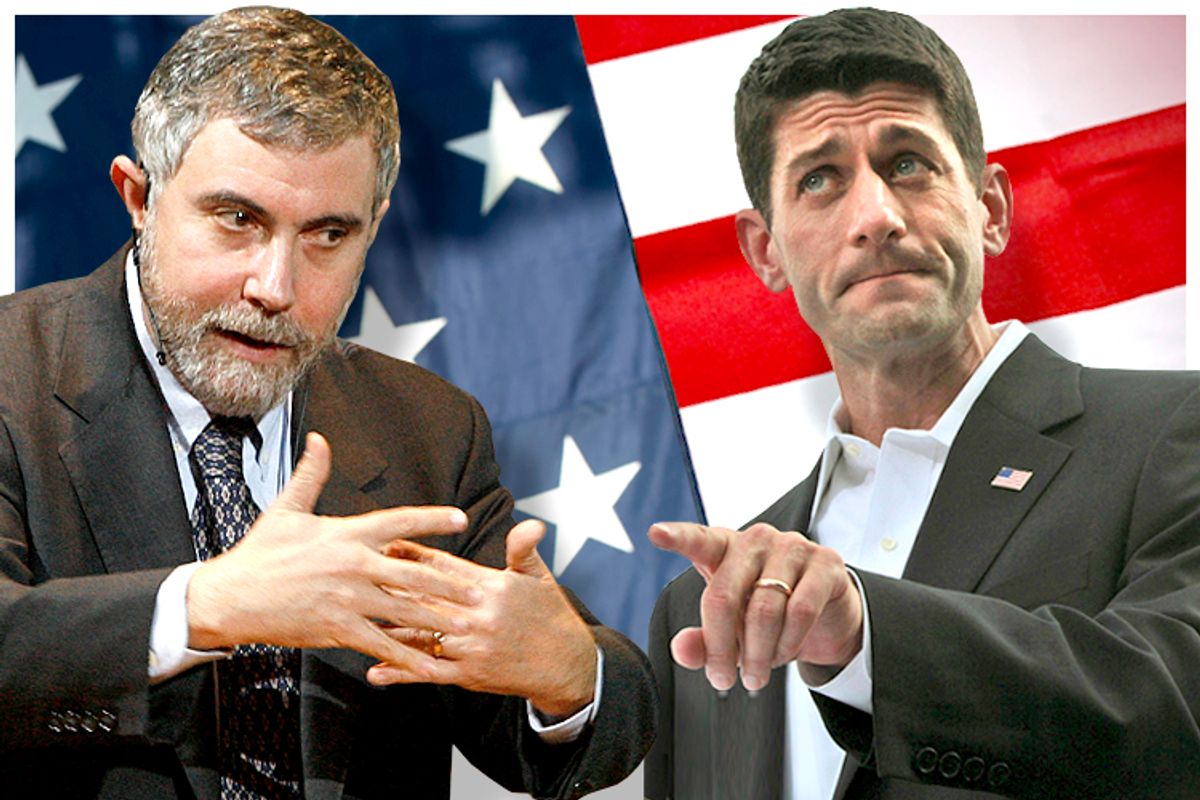Wisconsin congressman and former GOP vice presidential nominee Paul Ryan has spent much of the past week backtracking after claiming on a right-wing radio show that "culture" was to blame for poverty in America's "inner cities." While Ryan's had his defenders in the media — the usual right-wing suspects, along with Slate's Dave Weigel — one of America's most influential liberals, a frequent critic of Paul Ryan, is not one of them.
That's right: Paul Krugman is going after the GOP's chief fan of Ayn Rand. Again.
In his latest column for the New York Times, Krugman slams Ryan for his controversial remarks, describing them as a "racial dog-whistle" intended to pander to white voters who think liberals are primarily interested in taking their hard-earned money and giving it to undeserving minorities. Mocking Ryan's subsequent claim that he was simply "inarticulate," Krugman sarcastically writes that the House GOPer "even cited the work of serious scholars — people like Charles Murray, most famous for arguing that blacks are genetically inferior to whites."
"Oh, wait," Krugman jokes.
Although he gets his shots in at Ryan, Krugman's column takes a broader view of the relationship between race and redistribution in conservative politics. Calling race the "Rosetta Stone that makes sense of many otherwise incomprehensible aspects of U.S. politics," Krugman argues that Ryan's "inarticulate" comments were simply indicative of the whole right-wing worldview.
But one of the many problems with the right's understanding of race and politics, Krugman writes, is that it's locked into unthinking assumptions about the state of the American economy — i.e., conservatives assume there are good jobs for minorities to have, if they weren't too lazy to find them, when the truth is that jobs are scarce and wages are stagnating.
In the 1970s it was still possible to claim in good faith that there was plenty of opportunity in America, and that poverty persisted only because of cultural breakdown among African-Americans. Back then, after all, blue-collar jobs still paid well, and unemployment was low. The reality was that opportunity was much more limited than affluent Americans imagined; as the sociologist William Julius Wilson has documented, the flight of industry from urban centers meant that minority workers literally couldn’t get to those good jobs, and the supposed cultural causes of poverty were actually effects of that lack of opportunity. Still, you could understand why many observers failed to see this.
But over the past 40 years good jobs for ordinary workers have disappeared, not just from inner cities but everywhere: adjusted for inflation, wages have fallen for 60 percent of working American men. And as economic opportunity has shriveled for half the population, many behaviors that used to be held up as demonstrations of black cultural breakdown — the breakdown of marriage, drug abuse, and so on — have spread among working-class whites too.
These awkward facts have not, however, penetrated the world of conservative ideology. Earlier this month the House Budget Committee, under Mr. Ryan’s direction, released a 205-page report on the alleged failure of the War on Poverty. What does the report have to say about the impact of falling real wages? It never mentions the subject at all.
And since conservatives can’t bring themselves to acknowledge the reality of what’s happening to opportunity in America, they’re left with nothing but that old-time dog whistle. Mr. Ryan wasn’t being inarticulate — he said what he said because it’s all that he’s got.

Shares